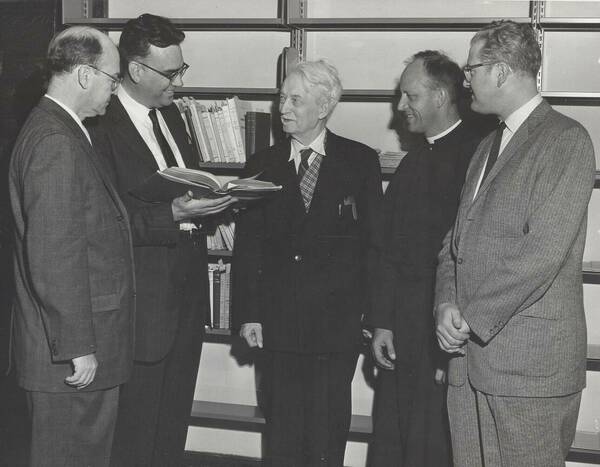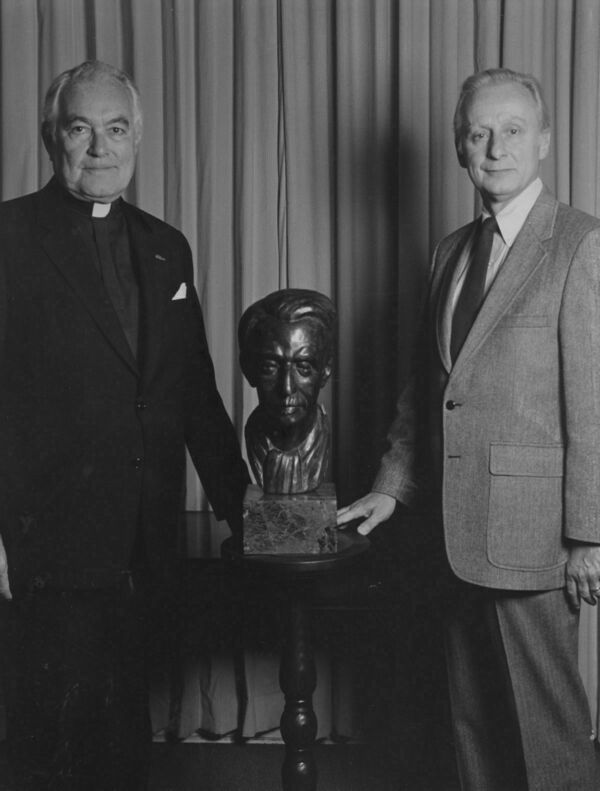History of the Center
The first visit of the great French Catholic philosopher, Jacques Maritain, to the University of Notre Dame took place in the late fall semester of 1938. Subsequently, Maritain became one of the many intellectuals who took temporary refuge in the United States during the upheaval of World War II. While passing through various American and Canadian institutions from 1940-1944, Maritain frequently came to the University of Notre Dame, where his student Yves R. Simon was already on the faculty. During his visits Maritain would lecture and meet with colleagues and such as Rev. Gerald B. Phelan, who had known Maritain at the Pontifical Institute of Medieval Studies in Toronto and moved to Notre Dame as the inaugural director of its own Medieval Institute in 1946. From these visits blossomed Maritain’s long-standing relationship with Notre Dame, which even involved Maritain’s being consulted on the core curriculum. Eventually, this relationship culminated in the founding of the Jacques Maritain Center on September 25, 1958 (see press release), with the aim of ensuring that Maritain’s thought and spirit would remain active at Notre Dame.

The Center was founded by Notre Dame philosophy professor Joseph W. Evans in collaboration with his colleagues Frank Keegan and Fr. Leo R. Ward, and received great encouragement from Fr. Theodore M. Hesburgh, a great friend and admirer of Maritain. In the press release for the Center’s founding, Evans praised Maritain as someone who is “admirably attentive to the real, a man who goes beyond phenomena and signs, a man who really comes to grips with the deepest dimensions of things,” but also someone who expresses a “profound sense of love” that has “touched and stirred people in every walk of life.” Evans directed the Center from 1958 until his death in 1979, focusing his activities on the twin occupations of translating works of Maritain into English and teaching thousands of students. The indelible personal impression that Evans made on his students was a living tribute to the impact that the thought and life of Maritain had on him.

Under the leadership of Ralph McInerny, director from 1979-2005, the Maritain Center grew to become a widely-respected center for Thomistic studies at Notre Dame, collecting and preserving books, dissertations, and archival materials to facilitate research into the thought of Maritain and promote the neo-Thomistic revival—material that grew to become the collections that the Center proudly houses today. During this time, the Center held regular weeklong summer schools or “Thomistic Institutes,” bringing together leading Catholic Thomistic scholars and junior scholars. Other activities included a Thomistic reading group and the “Thomas Aquinas Society” for undergraduates, as well as meetings devoted to the thought of Maritain, in conjunction with the Institut International Jacques Maritain and the American Maritain Association.
From 2005-2023, John O'Callaghan took up the reins of the Center. Under his leadership, the Center expanded its international profile, welcoming scholars from Kenya, Argentina, Italy, France, Mexico, Spain, Chile, Switzerland, China, Venezuela and the U.S., who came to work with the Center’s collections for periods varying from a week to a year. The Center also collaborated regularly with the Pontifical Academy of St. Thomas Aquinas (Rome) and the Symposium Thomisticum (a major conference held each summer in a different European country). In 2022, a “virtual colloquium” on Thomas Aquinas and the Natural Law that the Center sponsored, together with the Angelicum’s Thomistic Institute and the Notre Dame Beijing Global Gateway, drew over a thousand participants.
The Maritain Center, originally located in Bond Hall, moved to the seventh floor of the newly-constructed Hesburgh Library in 1963. There it remained, adjoining the Medieval Institute, until 2011, when O’Callaghan oversaw the move to its new quarters on the fourth floor of Geddes Hall, where it remains located today.
Beginning in 2023, the Center is directed by Therese Scarpelli Cory, John and Jean Oesterle Associate Professor of Thomistic Studies, working with a team of talented and dedicated faculty and staff.